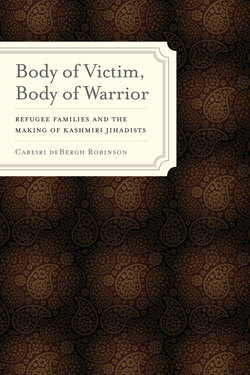Body of Victim, Body of Warrior

Реклама. ООО «ЛитРес», ИНН: 7719571260.
Оглавление
Cabeiri deBergh Robinson. Body of Victim, Body of Warrior
Отрывок из книги
Body of Victim, Body of Warrior
Edited by Dipesh Chakrabarty, Sheldon Pollock, and Sanjay Subrahmanyam
.....
I conducted the fieldwork upon which this book is based between 1998 and 2008. That fieldwork included twenty-two months of ethnographic research with Kashmiri refugees in Azad Jammu and Kashmir and in Pakistan and four months of archival research at the National Archives of Pakistan. I maintain connections with overseas Kashmiris based in the United States and in England, and over the years I have met with Kashmiri political party leaders on extended political or personal visits in New York, London, and Geneva. My primary methods were participant observation, life-history interviews, and archival research. I also conducted numerous structured interviews on topical issues with government officials and administrators, politicians, and religious leaders. Published scholarship on AJK is limited, and a number of relevant sources are available only in Urdu. I use the available materials—including histories, pamphlets, and memoirs—to contextualize my analysis of the historical development of Kashmiri refugees as a political category, and I draw on government documents from the National Archives of Pakistan, which holds the original records related to Kashmir refugee relief in Pakistan from 1947 to 1965. I also examined jihadist publications, including magazines and taped lectures and songs (tarānas). The conclusions that I present in this book emerged from a sustained analysis of various kinds of information considered in light of others.
I designed my research around the different categories of refugees rather than the places where I could encounter them. I thus met with men and women, displaced during each of the wars and from various parts of the Jammu and Kashmir region living in both AJK and Pakistan. This design accommodated the theoretical issues involved with working with Kashmiri refugees as well as the pragmatic concern that my access to any particular place could change unexpectedly. I was always aware that any number of factors could affect my ability to work with a particular community in a particular place, including the escalation of tensions between Pakistan and India or a decision by the Ministry of Kashmir Affairs that local conditions were dangerous for foreigners. On many occasions I adjusted the timing of meetings with people or visits to certain places in order to allow people to evaluate my project and reputation among other communities. In the first year of my research, I avoided developing close ties with political parties and formal associations to keep my research separate from their political projects, although I did visit a number of nongovernmental organization (NGO) projects on request. Once I felt that my research was well established and that I was not seen as affiliated with any particular group or party, I began meeting with political representatives. Over the years, my fieldwork within AJK has been made feasible by some of these connections.
.....